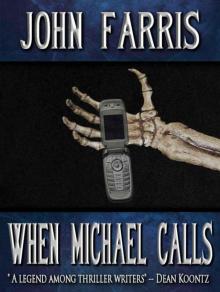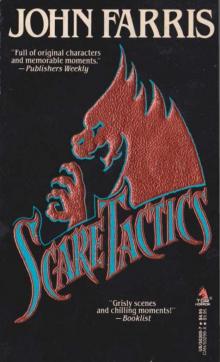- Home
- Farris, John
Captors Page 5
Captors Read online
Page 5
Carol pushed a sheaf of blonde hair away from her face. "Just—stay."
He gestured toward the bed. "Your breakfast is ready."
She looked at the tray, at the plastic dishes, the shirred eggs on strips of broiled ham, fresh orange juice in a plastic tumbler, corn muffins with butter melting on them, a pot of tea.
"Aren't you hungry?"
"I don't know," Carol said vaguely. But she sat down and began to eat. She found the food delicious. There was only a plastic spoon to eat with, which was inconvenient, but she managed. "Don't go away," she asked him, between mouthfuls. She heard singing again. Both of them looked up. Carol smiled, but the young man didn't look pleased.
"I don't remember your name," she said earnestly, "but your face is familiar."
"Is there anything else I can bring you?"
Carol thought about it. "I'd like some flowers." She chewed solemnly on a piece of cornbread, then giggled.
"Flowers," he repeated, nodding.
"Peonies," Carol specified. "But not white peonies, it's too white in here already. Make them red."
"Red peonies," he said, and then, formally: "Are you comfortable?"
"Sure," Carol said, pouring herself some tea.
"Very good." His voice sounded forlorn to her; she glanced inquiringly at him. He did look sad about something. "Say!" Carol said suddenly, remembering. "Hadn't you better hurry? You'll be late to old what's-his-name's lecture." His expression didn't change; he continued to look broodingly down at her. And Carol (although she knew very well she wasn't suppose to worry about anything) was afraid she'd offended. But then he took off the sunglasses, folded them and put them in his shirt pocket, smiled. His teeth were far whiter than anything else in the monochromatic bedroom.
"I'm never on time anyway."
"That's right, you're never on time." So it was all right to tease him; she hadn't been sure how he'd take it. He was very touchy, she knew that much. Proud and touchy. But terribly nice.
"Don't you want to drink your tea?" he asked.
Carol shrugged. She'd eaten every scrap of food, and it had filled a void which she hadn't been aware of. "How about a cigarette?" she ventured.
"Of course." He produced a pack from his shirt pocket, lit one for her, then, after a slight hesitation, lit another for himself. Carol put one hand behind her and leaned back on the bed, luxuriously exhaling a cloud of smoke.
"That was awfully good," she said, indicating the breakfast tray.
"Your tea's going to get cold."
Carol was about to tell him she didn't care for any, but he'd been so helpful and kind she didn't have the heart. She sat up again when he handed her the cup and saucer. "How about yourself?"
"I've had breakfast," he said.
She sipped the tea so as not to hurt his feelings. It was lukewarm, excessively sweetened. Even so there was a bitter aftertaste on the back of her tongue. But he seemed so eager for her to drink it all that she went ahead and drained the cup.
"You could tell me your name," she said.
"Yes," he said, with a sparing smile, but he didn't. Carol decided it was to be a game. She sincerely liked him, although he wasn't the best company; he seemed ill at ease. Well, she was the hostess, up to her to make him feel right at home. She patted the bed beside her. "Why don't you sit down?"
He declined, with a quick shake of his head. "You know—I probably shouldn't tell you this—but there's the strangest painting in the bathroom. By the way, this isn't your room, is it? Good. I wouldn't want to criticize if it was. Whoever lives here owns only one painting, and it is a dilly." Carol giggled, thinking about it. She had begun to feel slightly tired, well relaxed, a trifle on the warm side. Her vision was blurring again. That was really crazy, to own only one painting, with so much white wall space in the bedroom. But maybe he hadn't wanted Carol to see all his other paintings, so he had taken them down and hidden them from her. Oh, well. "Anyway, this painting—you just have to see it for yourself. Why don't you go have a peek? I don't think I could begin to describe it to you."
He shook his head again, with so much sadness in his pitchy eyes it all but broke Carol's heart. "I have to be leaving," he said, and bent to pick up the tray with the breakfast things.
Carol felt genuinely contrite. She knew she was at fault because he obviously was not enjoying himself. Impulsively she leaned over and kissed him full on the lips. It was to have been a soul kiss, warmest regards, but he jerked away after a second's contact, looking startled and curiously violated.
"It's all right," Carol said, watching him mistily. "I always did want to kiss you, I think. You were so—aloof and serious. Let's be friends." She reached up and opened the front of her shirt for him. He bowed his handsome head slightly. His lips parted; he seemed to be in pain. "If you want to—if it would make you feel better," Carol said, "you can make love to me." She cupped her breasts with her hands. "I think they're pretty nice, don't you?" His pain deepened, muscle bulged in his wide jaw. "I know all of you boys want to make love to blonde women," Carol said conversationally, trying to put him at his ease.
He almost ran for the steps, the breakfast things bouncing and chattering on the tray. Carol was mortified. She knew she wasn't supposed to worry, but he had looked so angry and upset with her that she couldn't help it.
"Wait!" she said. "I'm sorry."
He paused at the top of the steps.
"I'm really very sorry," Carol said tearfully. "It's—" he began, stammering, "it's all r-right, you—" He shook his head hopelessly, his lustrous black, modishly long hair all uncombed now. "Will you come back to see me?"
"Button up your shirt," he said, his voice guttural, unfriendly in command.
She complied, meekly. "Soon," she said.
"All right." His promise was barely audible. Then his head swung toward Carol; there was a glitter in his flat eyes that fascinated her. "Listen, chica, I want you to promise. Don't do that again. Don't unbutton your shirt. Not in front of me, or anybody."
"I won't," Carol said, chastened.
He went down the stairs quickly. Carol looked after him for several seconds. Then she yawned, her interest waning. She really liked him, though. She certainly hoped he would come back soon. It was lonesome by herself. There was nothing to do. She lay back on the bed, her bare feet propped on the wrought-iron headboard. The little dormer window was filled with blue sky. Carol regarded it patiently.
I could get up there, she thought. The chain is long enough.
She kicked aimlessly at the iron, rocking the bed, eyes on the bright blue pane above. I could get up there and—
No one was singing now. It was very quiet. The room had become warmer. Carol brushed sweat from her forehead with her fingertips. The chain made a noise. She hummed drowsily to herself.
I could get out, she thought.
After a while—she had no idea of how much time had passed—a different man came up the stairs to see her. She was still watching the changeless blue in the dormer window, waiting for a cloud, or a bird.
"Hello, dear," he said, standing at the foot of the bed.
"Hello." Carol wasn't sufficiently interested to look around at him.
"Is everything all right?"
"Sure."
"You're not worried about anything, are you?"
"No, I'm not worried," Carol said obediently, and resumed humming to herself. He didn't ask her anything else. She supposed he had gone away. She didn't look to see.
I could get up there, she thought judiciously, if I really wanted to.
But I don't. Do I?
Chapter Four
Tuesday, June 25
At first light, Felice came fully awake in her bed, sitting up convulsively, staring at the dawn-luminous tilted mirror of the vanity opposite. Her throat was dry and closed; she felt light-headed and oppressed. Her first thought was of Carol.
"Sam," she said, despairingly, and looked for him, but he hadn't slept beside her.
A glass of wa
ter had staled on the commode by the bed. She drank part of it anyway, then fumbled for her pillbox and two tranquilizer tablets. When they were down she lit a morning cigarette. Sam had been thoughtful enough to leave half a pack for her.
The room was cool and damp. Felice got up. The sheets seemed to be wet enough to wring; she wondered how she could have sweated that much in a single night without awakening. She put on a robe and went into the bathroom. The door to Sam's bedroom was closed. She opened it an inch and looked in. He had fallen asleep on his back, arms outflung. He was snoring lightly and still wearing his glasses.
Felice went in quietly and took off the glasses; Sam didn't stir. She looked at his face for half a minute, avid, absorbed as always. He had a young, lean, handsome face with high cheekbones, deep eye sockets, a wide mouth with a small white scar at one corner of his upper lip. His face was lined just enough to nullify any impression of boyishness. He was getting a little bald at the back of his head. She thought of these things and was comforted by what was familiar and predictable.
Still she had to remind herself she had seldom seen even an inch below the surface of Sam Holland. Felice could not decide if she was at fault for wanting the impossible. Her husband was neither cold nor selfish, an emotional enigma; he had humor, he could love and talk openly of loving. But Felice had the heart of a big, raggedy spaniel, happily plunging into relationships. She had good intuitions and trusted them. Sam was forced to approach new people by degrees, always guarded, although there was nothing oppressive about his reserve. A touch of melancholy, perhaps, of irony, as if he lived in enchanted blind alleys. Blame the austere upbringing, the lack of parents, the long groping search for a sense of personal worth. He was the only man who had ever puzzled her, challenged her, kept her subtly off balance. She had adjusted to his ways and his drive without conscious thought; she had loved him—still loved him—but often with a sense of defeat that was all but unshakable.
Felice took a warm, soapy shower. The tranquilizers worked, changing grinding fear into a low-key, bearable apprehension. She was able to plan. Breakfast first, for all of them. Then cancel the luncheon date. She would need a few things from the A&P; Kevin could go with her, later in the afternoon. With Mattie Dowd gone for a month she was having to learn to shop all over again. There was that tentative thing with the Colvins for evening; drinks, a few rubbers of bridge, with the old mother talking their ears off. Cancel, gladly. Pretext? Sam too tired, although used that one a couple of weeks ago.
As soon as Felice turned the shower off she heard Sam cry out. She dried off hastily, then wrapped the big towel around her and went into his bedroom. He was sitting up, rubbing his forehead, wincing, showing the tooth rimmed in gold. His off-color hazel eyes had that deep tarnish that appeared when he had worked long and hard, drunk too much, slept poorly. She noticed the bottle of gin, half empty, on the carpet beside the bed.
"Sorry," he said. "I didn't mean to sound like a wounded bull. Gin headache, and a stiff neck along with it."
"I'll run a hot bath."
"That would be the best thing." He cracked a smile for her. "How are you?"
"I just keep flapping my wings, hoping I'll take off. Waking up must have hurt you. It was almost like a scream."
"I was having a choice nightmare. Do you ever dream about funerals?"
"Oh, God! Don't tell me about it."
"Supposedly it was the funeral of my mother. I hadn't set eyes on her since I was three days old, so I was curious to see the old girl. It was a nice dim chapel. No flowers at the bier; that bothered me. But someone was playing the organ beautifully, and there were mourners. I don't think I knew any of them."
"Sam, I really don't want to hear."
"I approached the coffin—as one must—and looked inside. But it wasn't my mother. It was me. I could see where they had plugged the bullet hole in my forehead with mortician's wax. Then, just like that, I was inside the coffin looking out, and the lid started down—"
"All right," Felice said, furious. She went into the bathroom and turned on the taps for his bath, then continued to her room, where she put on a shift and pinned her hair up and applied a light coat of pale-pink lipstick.
"Felice," she heard him say, and reluctantly she returned to his bedroom. He hadn't moved. His hands were clasped in his lap. He smoothed the carpet with one narrow foot.
"I forgot, for a minute. I forgot about—"
"No big thing. Your bath's almost ready." She hesitated, then said, "I still don't understand why you didn't go to the police about it. You had a bullet hole in your windshield."
"One bullet hole, no bullet. They would have been polite and regretful, and maybe there would have been three paragraphs in the Lubbock papers. I'm sure one of the wire services would have picked up the story. I suppose I didn't want anyone else getting ideas. Brethren of the Radical Right, it's open season on Sam Holland, who has bad-mouthed us once too often. Not the biggest trophy head around, but he travels light and alone, and you all bear in mind that little Communists get to be big Communists."
"But you saw the one who took the shot at you."
"I saw a face on a dark street. It was only a glimpse. I don't know what he looked like." Sam passed a hand over a bristly jaw. "He might have been serious enough to try again, so after I bashed in the broken place with a brick, I wasn't inclined to hang around town. If there had been a bullet in the car somewhere, then I might have brought in the cops. Naturally it could never be proved, but I've thought that it would be a nice irony if the gunman had been using a rifle from the arsenal of Henry Phelan Morse. He's furnished plenty of material aid and comfort to those Minuteman types."
"Shut up, Sam," she warned him, in a voice he seldom heard. He nodded once, wearily, accepting the reprimand, and went to his bath, shedding his pajamas on the way.
"Give me twenty minutes," he said.
As soon as Felice reached the first floor a man came out of the library and introduced himself as Special Agent Crockett. It was still a shock for her to realize these men were in the house, and what they were there for. Like Sam, this agent was in his mid-forties, trim, bespectacled.
"Is there any news?" she asked him.
"I haven't heard anything. Mr. Gaffney will be here soon, though, and he'll bring you up to date."
Felice offered the two agents breakfast and went back to the kitchen.
Early as it was—ruckus of birds, grass beaded from the dew, trees still dark and motionless against a sky hinting of opal—her father was already there. He was drinking buttermilk on the porch, watching Riggs course for an unwary rabbit or woodchuck. The ten-acre pond at the rear of the two properties was misted over, showing a core of gold from the just-risen sun.
"Good morning," she said, brushing a kiss against his frail cheek. "Did you sleep?"
"Not a wink," he grumbled. "Who's up?"
"Sam, so far."
He grunted something, turned his head to look for the dog. Felice asked how many eggs he wanted and retreated to the kitchen, concentrating on the breakfast menu. She thought she was functioning smartly, well coordinated, with all emotions sorted, graded, compartmentalized. Eight eggs, no, make it nine. There was a slippage, a little blank space. And then she became aware of the General standing behind her, saying in his half-throttled whiskied voice: "You've been holding that damned door open for almost three minutes. Can't you find what you need?"
Felice turned and looked up at him, her mind in its peculiar terrible stall; her legs felt overused, unbearably wobbly.
"What—what are they going to do to Carol?" she whispered.
The General's unstable blue eyes opened a little wider. "Not a damned thing. They're taking good care of her."
Felice shook her head, bewildered, annoyed. "I don't believe it. That's what everyone wants to believe, but I can't anymore. It's all the same to the kidnappers, isn't it? Whether she lives or dies?"
"She'll be back in this house tonight, Felice."
"What makes
you think so?" she asked calmly, eyes on his face, daring him to be right.
"Because they're good. They took Carol in broad daylight, without a fuss. Maybe Gaffney's crew will turn up some kind of eyewitness, somebody saw something that looked a little funny, but that's a long shot. I sat all night trying to figure from what we already know how the rest of it's going to happen, and this is the way it looks to me. There's three of them, all young—"
"Three? How—"
"They asked for two hundred twenty-five thousand. That's seventy-five thousand a man, and even in fifties and twenties it wouldn't be hard to carry that kind of money around. The whole amount could be packed solid in a thin-line attaché case. If these boys were stupid and greedy they might have gone for the whole hog instead of just taking a good-size bite. Say, three-quarters of a million. I can afford it, but that kind of money creates problems. My bank has to get the bills from the Reserve, which takes time, and also it would take a good-size suitcase to hold it all. These boys want to collect fast and inconspicuously. Now, when the call comes they'll likely specify one of those tan attaché cases, probably ten million of them in the whole country, and they'll instruct Sam to put that case with the money in his car and drive down to La Guardia airport, timing it so he arrives about six P.M. That's the peak traffic hour, and La Guardia is always jammed then. He'll be told to report to one of the luggage-claim areas, American or TWA, and put the case down with some incoming luggage and get the hell out of there. You know what a mob scene that is, people lined up six deep trying to get their bags. A dozen cops couldn't keep their eyes on that one little case. But I don't think the pickup man would just walk away with it. No, he'd have a larger case, with a trick bottom, like shoplifters use, and he'd just slip his own case down over the one Sam left and ten minutes later he'd be on a plane for Chicago or someplace to join up with the others."
"And Carol?"
"One quick phone call after his plane touches down, and the police will have Carol home in no time."
"You make them sound—very businesslike, and not frightening."

 Sacrifice
Sacrifice Wildwood
Wildwood Fury
Fury Captors
Captors When Michael Calls
When Michael Calls Fury and the Power
Fury and the Power Dragonfly
Dragonfly Scare Tactics
Scare Tactics